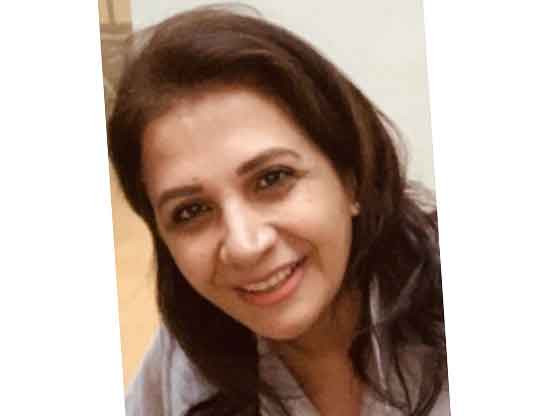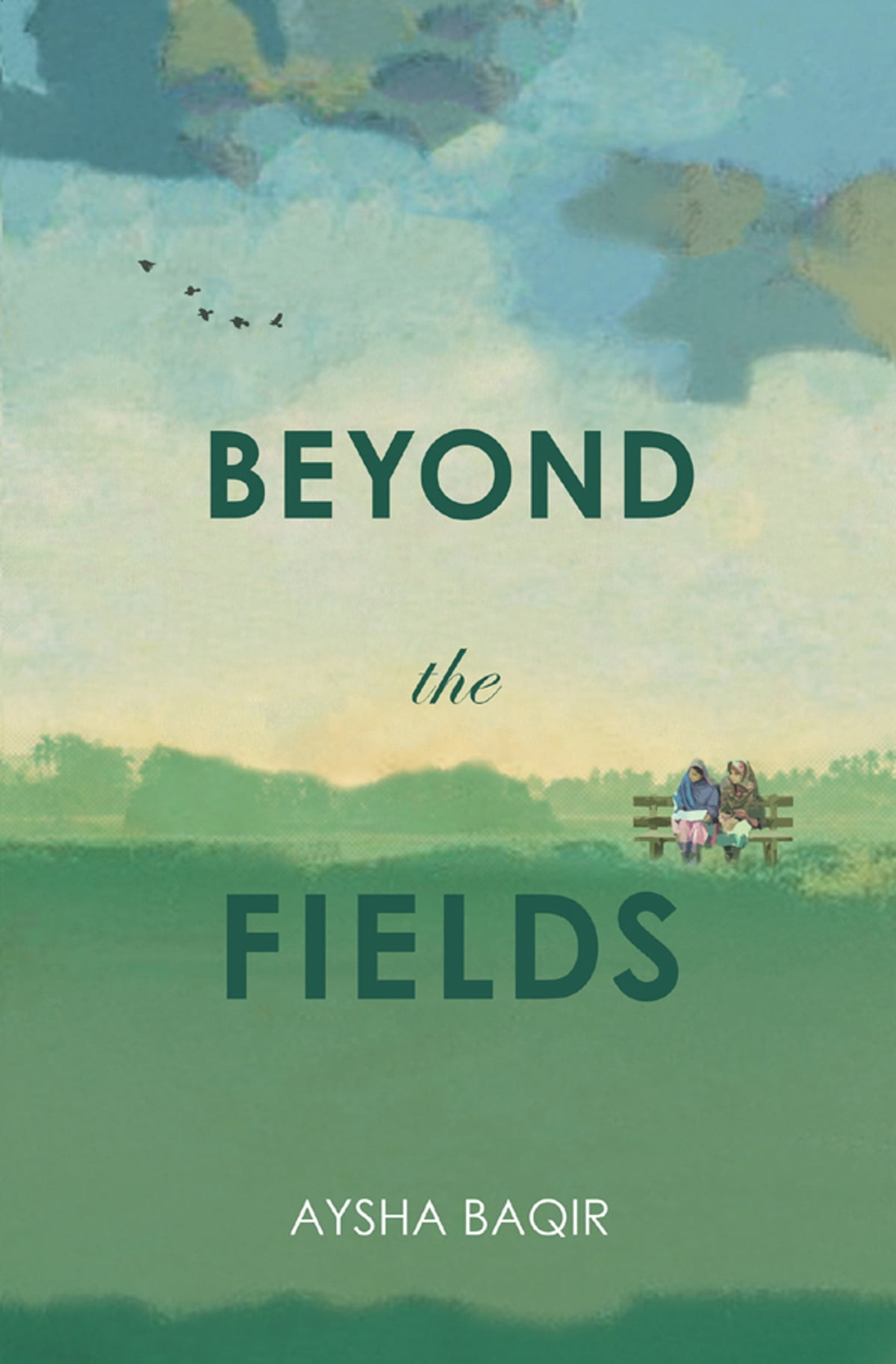It is said that life is not easy for women in Pakistan, more so for women in rural areas, and rightly so. They spend their lives bound by traditions which not only limit their opportunities for education but for movement as well. While most spend their lives amid restrictions taking care of children and household chores, there are some who dream to fly and break the shackles of society while living within the society and achieve something, if not all they dream of.
Aysha Baqir, the author of Beyond the Fields founded the Kaarvan Craft Foundation, a non-profit economic development organisation to empower women in low-income communities. Her development work in the villages of South Punjab became part of her inspiration to write the harrowing story of twin sisters Zara and Tara, living in rural Punjab in the 1980s.
Denied their rights by the conservative society they are born in, their status as women and their prospects to use any talents they may have are controlled by men in the name of religion and culture. Women are expected to be good and subservient wives to the men chosen for them by their family.
This is the case with most women in the country and is not limited to rural areas. Women’s lives are governed by traditions which they have to abide by even at the cost of their lives. Men don’t hesitate from killing their women in the family in the name of honour, if they deviate from the set norms.
Born to a poor, landless farmer, the protagonist, Zara, and her twin sister, Tara, grow up amongst wheat and cotton fields in a remote village, where life is hard as the landlord and his thugs are a constant threat. The country is under a harsh military rule [Pakistan in the 1980s], with Islamisation of society in process and the overarching atmosphere being one of repression. With severe anti-women laws in place, there were protests in cities. Village life, too, witnessed violent repression and there was emphasis on strict adherence to the rules of proper behaviour, family honour being more important than anything else.

Tara is the ideal teenage daughter — obedient and mild-mannered — while Zara is the opposite, strong-willed, not willing to accept limitations, and questioning status quo. Zara who wants to study, and move around freely, questions age-old customs such as arranged marriage. With more on her mind than marriage, she cringes when she sees young girls playing wedding games. “Could they think of nothing else except marriage?” She does not rebel but grabs every opportunity to gain what she sets her mind to. She knows where she stands. “My obedience was a yardstick of my parents’ in the village. If I rebel, I dishonour them and my family name.”
As a 15-year-old, she is forced to wear a burqa and not allowed to play outside. She wants to study like her brother but girls in their village are not supposed to study. Her brother tutors her at home and her mother, while upholding some of the most restrictive traditions, allows her to study on the condition that no one would get to know about it, not even the father.
When Zara says something about Neil Armstrong’s landing on the moon in a family gathering, “some heads nodded, but others shook and muttered disapprovingly. ‘And how does she know all this?’… ‘My son, her brother, he tells her what he learns at school,’ said Amma quickly.
“‘And you allow it? That’s not wise. There’s a reason we don’t send our girls to school. They start to think for themselves and…’”
Her mother is warned: “Take charge before she ruins your name. Better to nip such thoughts in the bud.”
Zara is not ready to accept restrictions. She is listless and always ready to venture out. One afternoon, the twins and their brother decide to play outside for a while, but fate has something else in store. Tara is kidnapped from the fields and raped. From here on their lives change.

Against the backdrop of martial law and social turmoil, the book depicts the fears, despair and hopes of women. After Tara’s rape their father wants to seek justice for his daughter and go to the police, but has to drop the idea when he is advised against doing so because of the new law — the Hudood Ordinance — which would require the victim to prove the blame, failing which she could be accused of zina and convicted. Even her evidence would not be sufficient as, according to the law, the testimony of one woman is only half of that of a man in the court.
The father is reminded that if the word spreads “he won’t be able to hold his head up. People will make up stories.” He has to think about his other children and he would also not be able to marry his other daughter. “She can marry anyone now, but who will want to marry her once you speak out.”
To avoid any scandal and the loss of family honour, it is decided to send Tara to the city to work as a maid, however, when as an unexpected marriage proposal comes up the parents accept it. The matter seems to have resolved, though the family confronts many questions by inquisitive and nosy women.
However, the nightmare resurfaces when a newspaper clipping emerges, putting doubts on the legitimacy of the marriage. Even at this time, the father is more concerned about family honour than his daughter’s safety and well-being. “She had been raped and then forced into a marriage to protect their ‘honour’. This was what Amma and Abba had done to her. Even now, he could think only about family name and honour. What family? What name?” thinks Zara.
The news of Tara’s husband upsets Zara and she resolves to rescue her. She sets out to find her twin and is ready to face all that comes her way. Half confiding her intentions to her brother, she manoeuvres to go to Lahore, ready to brave the unknown dangers of an urban centre.
Will Zara be able to rescue her beloved twin? Will she ever find the future she so desperately seeks? These are questions that linger in the readers’ mind through the second half of the book.
While the book tells a heart-breaking tale, it ends on an optimistic note if not for all but for some. The most interesting change is in the attitude of Zara’s mother. Though she had been supportive of Zara’s studies, she seems to be afraid of her husband and unable to take any decisions, but at the end she comes across as a woman with an opinion.
The book reflects on the strange concepts our society holds, especially when it comes to women. There seems to be no concept of divorce for a woman. For most “Once a girl is married, only her dead body should leave her husband’s house.” After Samina (a side character in the story) is brought back home by her father from her abusive in-laws’ and it is clear that her marriage is over, Samina’s mother, Kulsoom chachi [uncle’s wife], says “Better for my daughter to be dead than divorced.”
Similarly, when Tara comes back home, the inquisitive, and gossiping neighbours are back to ask questions.
“Sent back?!”
“A mother’s nightmare.”
“How do you sleep?”
“You have been cursed.”
“Nothing wrong with your girl, I hope.”
“Has she fought with her husband?”
Small snippets shed light on the society. For instance, when Chiragh (another side character, possibly created to reflect on the society and used as an example for other girls) is raped and murdered, the village women, except for a few, refuse under Bari Maasi’s [an elderly woman of the village] orders to prepare her body for burial. She had brought bad to the family and so was dishonoured. When Moulvi Saab began to read Chiragh’s funeral prayers, a mob gathered and threatened to set the mosque on fire. She had run away from home with a boy who had promised marriage but abandoned her. “On her return, Chiragh’s family had disowned her and moved away. Moulvi Saab had tried to stop her from returning to the village but our Pir had intervened and allowed her to return saying if she had no family to protect her, he would be her protector.” … “The villagers never forgot and never forgave. They prayed to God for mercy and forgiveness but had none to spare.”
The book mainly deals with the issue of rape and patriarchal limitations in Pakistan, and touches upon the barrier of lack of education, the greed and brutality of local landowners in rural areas, and how people in the city take advantage of the naiveté of villagers. At the same time it is a stark reminder of the blatant suppression of women’s rights through the draconian Hudood Ordinance.
When Majjo phuppi (Zara’s father’s sister) brings a paper with pictures of women being baton charged at a protest, Zara is left to think about the new law that her aunt had been talking about. The questions running in her mind: “What this new law meant? Was I half of my brother?” She had been taking notes in her copybook about the events from the Bhutto’s arrest and passage of Hudood Ordinance, etc.
While reading Beyond the Fields, readers get a flavour of village life — women busy all day in household chores such as washing, cooking cleaning and also looking after animals. An array of nosy neighbours and concerned relatives are always around; some are helpful while some, especially women, are just looking for juicy gossip. Any issue prompts a meeting of relatives and trusted friends for resolution.
Zara and Tara may be fictitious characters but the harsh realities depicted in the book are not. Though the book is set in the 1980s, the issues it touches upon, i.e. the subjects of rape, sexual abuse of children and the consequences that result from the suppression of these issues being taboo and not being discussed are relevant to this day, as is evident from the reports of harassment and killings in newspapers that we read almost every day.
Rizwana Naqvi is a freelance journalist and tweets @naqviriz; she can be reached at naqvi2012rizwana@hotmail.co.uk. All information and facts are the responsibility of the writer
